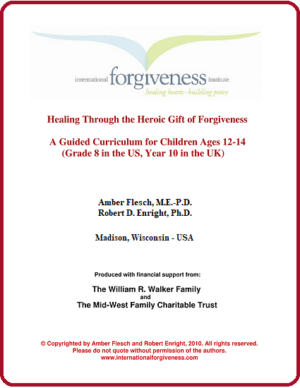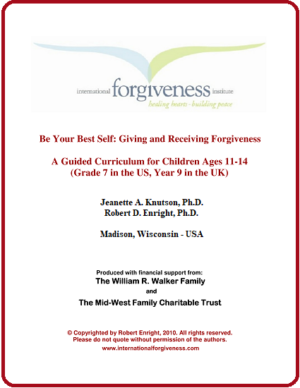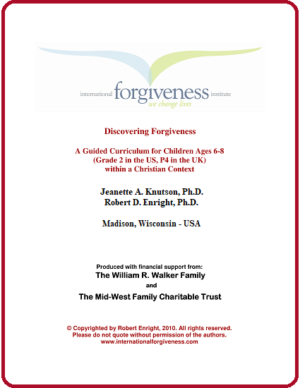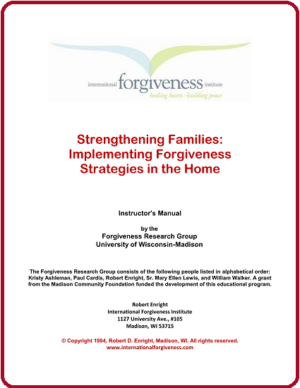Grade 1 Adventure of Forgiveness
$10.00
Description
The main point of curricula for 6-8-year-old children (The Adventure of Forgiveness and Discovering Forgiveness) is to introduce the children to the basics of forgiveness. We do this primarily through Dr. Seuss books (such as Horton Hears a Who) for first grade and Disney stories and DVDs (such as The Fox and the Hound) for second grade. When we use that term—the basics of forgiveness—we are talking about the central foundation that will allow the children to build forgiveness skills as they develop through their lives. The basics of forgiveness include five issues: inherent worth, moral love, kindness, respect, and generosity. All of these are described below.
Inherent worth. This is the important idea that a person is a person no matter what he or she does. It is akin to the idea that we are to love the sinner, but hate the sin. As children begin to see beyond what people do to what they are like inside themselves, they will be laying an important foundation for forgiving.
Moral Love. When we morally love someone, we love him or her unconditionally, despite his or her flaws. Certainly, someone who morally loves another can ask fairness of him or her. Yet, the one who morally loves has the other person’s best interest at heart. Moral love is not a selfish or self-centered love. It has that lavish notion of love that Joseph showed to his brothers. Moral love underlies true forgiveness.
Kindness. When people are kind, they tend to be warm-hearted, concerned about the other person, humane. People who practice being kind are laying the foundation for forgiving. Some people talk about the “change of heart” that occurs when someone forgives. The heart-of-stone becomes the softened heart.
Respect. When someone shows respect, he or she is highly regarding the other person. Some people think that respect must be earned. We believe, following the philosopher Immanuel Kant, that people possess intrinsic value to such a degree that we should respect all persons. We respect, not because of what people do, but because of whom they are. As children practice respecting all people, they make forgiveness easier in the future.
Generosity. To be generous is to give abundantly. It is a gift-giving that surprises and delights the recipient. If children can learn to be generous, they will be in a better position to understand what it means to give a gift of forgiveness to someone who hurts them.
Our intention in the first half of both of these earlier curricula was not to have the children understand or to practice forgiveness, but to understand the above five aspects of forgiveness. In both cases, we used children’s stories to illustrate the concepts. We used different stories in Discovering Forgiveness (a slightly more advance curriculum) than in The Adventure of Forgiveness to bring about this learning. We used more complex ideas in Discovering Forgiveness than in The Adventure of Forgiveness to challenge the students at their appropriate developmental level.
The second part of both of these earlier curricula was intended to once again introduce the above five basics of forgiveness in the specific context of forgiveness. We did not ask children at this point to forgive anyone. Instead, we asking them to understand how inherent worth looks in the context of forgiveness as described in stories. We asked the children to understand kindness and moral love, respect and generosity all within the context of forgiveness. We again did this through stories that illustrate these points.
Finally, in the third part of the curricula, we asked the children to think about someone who has hurt them unfairly. We then had them try to forgive that person by exercising the idea of inherent worth, and the virtues of moral love, kindness, respect, and generosity toward that person. This third part is the practical part of the curriculum. The first two parts set the stage for actual forgiving.
Forgiveness encompasses more than the practice of inherent worth and the exercise of the virtues of moral love, kindness, respect, and generosity. This is a curriculum based on the principles of developmental psychology. We want to start small, start with some of the basics, and keep it somewhat simple. We save the subtlety for later grades.
Our intent was to make the exploration of forgiveness interesting and fun. One does not learn to play football by being thrust into highly competitive, serious situations too early. At first, it is sufficient for the children to run out onto the field on a warm afternoon, kick the ball around, and not worry yet about all the rules and regulations. It is the same with forgiveness. Its introduction should be somewhat light, free of lots of rules, and fun.
The regular price of $10 per unit is for the electronic version of the guide that can be accessed and printed online.
Additional information
| Version | Christian Version – Electronic, Standard Version – Electronic |
|---|








